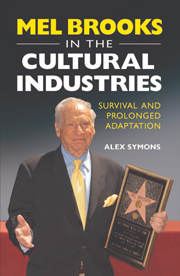Book contents
- Frontmatter
- Contents
- Acknowledgements
- Introduction
- 1 Rethinking Adaptation Studies: Survival Strategies in the Cultural Industries
- 2 From Sitcoms to ‘Parody-coms’: Writing for American TV, 1949–89
- 3 Prolonged Stardom: Audio Records, TV and Film, 1961–2004
- 4 Recycled Hollywood for the TV Generation: The Rise of Parody and the Fall of Mel Brooks the Director, 1974–95
- 5 The Integration of the Film and Theatre Industries: The Producers, 1968–2007
- Conclusion
- Bibliography
- Index
4 - Recycled Hollywood for the TV Generation: The Rise of Parody and the Fall of Mel Brooks the Director, 1974–95
Published online by Cambridge University Press: 05 August 2013
- Frontmatter
- Contents
- Acknowledgements
- Introduction
- 1 Rethinking Adaptation Studies: Survival Strategies in the Cultural Industries
- 2 From Sitcoms to ‘Parody-coms’: Writing for American TV, 1949–89
- 3 Prolonged Stardom: Audio Records, TV and Film, 1961–2004
- 4 Recycled Hollywood for the TV Generation: The Rise of Parody and the Fall of Mel Brooks the Director, 1974–95
- 5 The Integration of the Film and Theatre Industries: The Producers, 1968–2007
- Conclusion
- Bibliography
- Index
Summary
Whereas existing academic studies have examined Mel Brooks's career as a film writer and director, no study has yet accurately identified his production strategy or his actual contribution to film production trends. Dan Harries and Wes D. Gehring have credited Brooks for his adaptations of film content, specifically for his contribution to the perceived rise of the parody film genre in the mid-1970s. Similarly, in his study of the New Hollywood era, John Cawelti described Brooks's strategy as a practice of recycling content from older Hollywood cinema, like other filmmakers of that era, including Roman Polanski in Chinatown (1974) and George Lucas in Star Wars (1977). However, these studies have not identified Brooks's whole contribution. In short, Brooks has not just recycled Hollywood film, but has hybridised film content together with a wide range of content from television. It is through hybridising film with television that Brooks made his reputation as a director with Blazing Saddles (1974) and Young Frankenstein (1974), and in doing so, contributed towards a cycle of television-film hybrids that continues today. As I explain, the rise of television-film hybrids has been central to the production of what has come to be understood by critics as the parody film genre. Furthermore, it was, in part, Brooks's own apparent choice not to capitalise on television content to the same extent in his subsequent films Spaceballs (1987), Robin Hood: Men in Tights (1993) and Dracula: Dead and Loving It (1995) that brought about the end of his career as a film director.
- Type
- Chapter
- Information
- Mel Brooks in the Cultural IndustriesSurvival and Prolonged Adaptation, pp. 110 - 153Publisher: Edinburgh University PressPrint publication year: 2012



